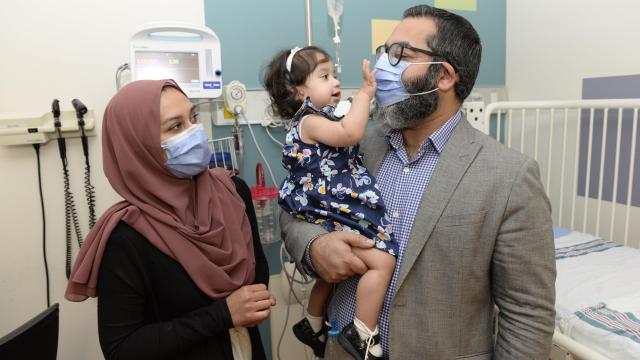A team of doctors in the U.S. and Canada are reporting a medical first. They were able to start treating a child’s rare and often deadly genetic condition while she was still a foetus in the womb — the same condition that claimed the lives of her siblings. Now 16 months old, the child, named Ayla, appears to be developing as expected, though she will continue to need ongoing treatment.
The condition is known as Pompe disease. It’s caused by mutations in a gene that’s responsible for producing the enzyme acid alpha-glucosidase, or GAA. GAA is used in the lysosomes of our cells to break down stored glycogen into glucose, which is the main source of fuel for the body. But people with Pompe produce much less GAA than usual, eventually resulting in their cells becoming overfilled with glycogen. This build-up causes all sorts of health problems but especially damages the heart and skeletal muscles. Early onset or infantile Pompe happens when these mutations cause people to produce little to no GAA, quickly leading to symptoms like an enlarged heart. Without treatment, most children born with this form die within a year from heart or respiratory issues. Pompe is rare, affecting an estimated one out of every 40,000 births.
Since the mid-2000s, there has been a standard treatment for Pompe — a replacement analogue of GAA that’s delivered via IV infusion. Even when enzyme replacement therapy (ERT) is promptly given to affected newborns, though, it can’t reverse the permanent organ damage that may have already occurred. Children also often develop a strong immune reaction to the treatment, making it less effective. As a result, many of these children still grow up to have developmental and/or motor problems.
But researchers at the University of California San Francisco and elsewhere have begun conducting a small Phase I clinical trial testing whether it’s possible to improve the outcomes of these patients by delivering ERT even earlier, while a baby is still developing in the uterus.
“The rationale for giving ERT before birth is to prevent the onset of organ damage, to get the enzyme into the [central nervous system] prior to closure of the blood-brain barrier, and to avoid an immune response to the missing protein,” senior study author Tippi MacKenzie, UCSF researcher and developer of the team’s protocol, told Gizmodo in an email.
The team’s new paper, published in the New England Journal of Medicine, details the early success seen so far with their first patient Ayla.
Though the trial is being led by UCSF scientists, they collaborated with doctors at the Children’s Hospital of Eastern Ontario (CHEO) in Canada, where Ayla’s family was recruited, and with Pompe experts at the Duke University School of Medicine, where the enzyme treatment was created.
Ayla’s mother had three prior pregnancies, all of which developed Pompe. Even with treatment, two of her children passed before age three, while the family decided to terminate the other pregnancy upon confirming the diagnosis. By the time she was enrolled and started on treatment, the mother was 24 weeks pregnant with Ayla.
Normally, the family would have travelled to UCSF for the trial, but pandemic-related restrictions at the time made that impractical. Instead, the researchers and doctors worked together to allow Ayla to receive it at CHEO. There are existing treatments that are already delivered through the uterus, such as blood transfusions, so the same standard procedure was used for Ayla’s therapy. Every two weeks for 10 weeks, she was given ERT through the umbilical vein. And about three weeks after the last session, she was born.
As hoped for, newborn Ayla’s heart seemed to be a healthy size upon delivery. And at 16 months of age, her heart and motor function look to be normal and she’s meeting all of her developmental milestones on time. There’s also evidence that her body is more tolerant of the therapy than it would typically be, compared to how her siblings responded to it. Over time, she’s required fewer medications to prevent immune-related complications.
“When we were having Ayla, we didn’t know if she’d be able to walk,” said Zahid Bashir, Ayla’s father, in a statement provided to Gizmodo by UCSF. “We didn’t know if she’d be able to talk. We didn’t know if she’d be able to eat. We didn’t know if she’d be able to laugh. So, as she hits each of these milestones, we continue to be amazed at her progress. So, yeah, it’s quite something, that I think sometimes we may take for granted, but most of the time we’re quite aware that she’s a miracle.”
Pompe isn’t the only genetic disease that the researchers are hoping to treat using ERT in the womb; their trial is approved for eight of these lysosomal conditions. Two other patients with different diseases have been enrolled in the trial since Ayla, with both having recently completed their prenatal therapy. These children have avoided complications like premature birth, but it’s still too early to know their other outcomes, according to MacKenzie. The trial will ultimately enroll 10 patients and will likely take several years to complete.
Future gene therapy treatments for Pompe may one day be able to repair or replace the underlying mutation that causes it. For now, though, Ayla and other patients like her have to keep regularly taking ERT to stave off the worst effects of the disease. But if the team’s research continues to show promise, then miracle stories like hers might become more common.
“We hope that this trial paves the way for more widespread use of prenatal ERT in affected patients, if we continue to see that it is safe and improves outcomes in other diseases,” said MacKenzie.
